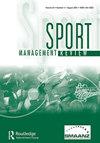利用体育赛事促进东道国社区的人权:在超级碗LIV上传播反贩运活动
IF 3.8
1区 教育学
Q1 HOSPITALITY, LEISURE, SPORT & TOURISM
引用次数: 1
摘要
摘要人口贩运是一个复杂的人权问题,自2004年雅典奥运会以来,它一直与举办大型体育赛事有关。随着对低工资劳动力需求的潜在增加,游客的涌入可能会导致对性服务的需求增加,而被贩运者可能会部分满足这种需求。活动权利持有人和当地组委会已经认识到人口贩运是一种需要管理的风险,从而在主办社区实施了反贩运举措。在这项研究中,我们采用了社会活动杠杆框架和创新传播理论来研究当地社区如何利用大型体育活动来提高对人口贩运的认识。利用社会建构主义的视角,我们利用工具性案例研究设计来了解规划、设计和实施与事件相关的反贩运运动的过程。在这种情况下,2020年超级碗在佛罗里达州迈阿密举行,这一案件有助于审查为提高对人口贩运的认识而利用活动的过程。数据包括对主要利益攸关方的半结构化访谈和档案材料。专题分析的结果强调了同行网络、地方和国际伙伴关系以及运动战略在开展与事件相关的反贩运运动方面的重要性。亮点利用创新的传播来检查与事件相关的社会营销活动的规划和管理。强调活动对提高对人口贩运的认识的社会价值。强调合作、对等网络以及现有的反贩运和活动基础设施在活动杠杆作用中的重要性。本文章由计算机程序翻译,如有差异,请以英文原文为准。
Leveraging sport events for the promotion of human rights in host communities: diffusion of anti-trafficking campaigns at Super Bowl LIV
ABSTRACT Human trafficking is a complex human rights issue, and it has been associated with hosting large-scale sport events since the 2004 Olympic Games in Athens. Along with potential increases in demand for low-wage labour, the influx of tourists may lead to increased demand for sexual services which may be met, in part, by trafficked persons. Event rights holders and local organising committees have recognised human trafficking as a risk to be managed, leading to the implementation of anti-trafficking initiatives in host communities. In this study we employed a social event leverage framework and the theory of diffusion of innovations to examine how large-scale sport events can be harnessed by local communities to promote awareness of human trafficking. Using a social constructionist perspective, we utilised an instrumental case study design to understand the processes involved in planning, designing, and implementing event-related anti-trafficking campaigns. In this instance, the case – the 2020 Super Bowl hosted in Miami, Florida – facilitated the examination of the processes involved in leveraging events for the purpose of increasing awareness of human trafficking. Data included semi-structured interviews with key stakeholders and archival materials. Results of a thematic analysis highlighted the importance of peer networks, local and international partnerships, and campaign strategy in the execution of event-related anti-trafficking campaigns. HIGHLIGHTS Utilises diffusion of innovations to examine the planning and management of event-related social marketing campaigns. Highlights the social value of events for promoting awareness of human trafficking. Emphasises the importance of collaboration, peer networks, and existing anti-trafficking and event infrastructure in event leveraging.
求助全文
通过发布文献求助,成功后即可免费获取论文全文。
去求助
来源期刊

Sport Management Review
Multiple-
CiteScore
9.00
自引率
7.30%
发文量
27
期刊介绍:
Sport Management Review is published as a service to sport industries worldwide. It is a multidisciplinary journal concerned with the management, marketing, and governance of sport at all levels and in all its manifestations -- whether as an entertainment, a recreation, or an occupation. The journal encourages collaboration between scholars and practitioners. It welcomes submissions reporting research, new applications, advances in theory, and case studies. The language of publication is English. Submissions are peer reviewed.
 求助内容:
求助内容: 应助结果提醒方式:
应助结果提醒方式:


